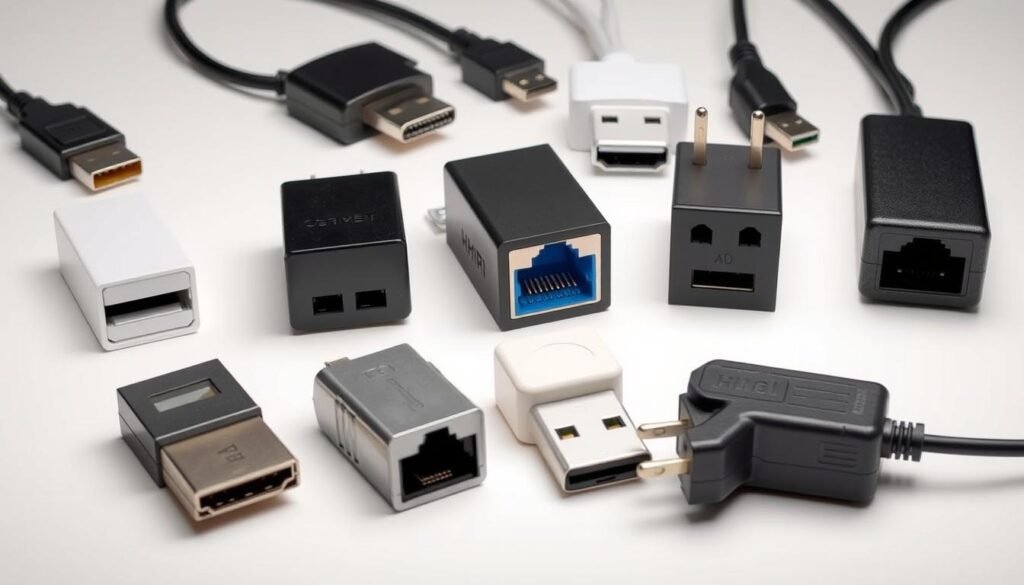In our increasingly digital world, network adapters are essential components that facilitate communication between devices and networks. Whether you’re connecting a desktop computer, laptop, printer, or smart device, understanding the different types of network adapters is crucial for optimizing your network performance. This article will explore the various types of network adapters, their functionalities, and how to choose the right one for your needs.
What is a Network Adapter?
A network adapter, commonly referred to as a network interface card (NIC), is an essential hardware component that allows devices to connect to a network, whether through wired or wireless means. It functions as a bridge between the device (such as a computer, smartphone, or printer) and the network, facilitating communication over various network types, including local area networks (LANs), wide area networks (WANs), or even the global internet. The network adapter is responsible for managing data transmission and receiving signals, enabling devices to send and receive information smoothly.
Network adapters come in different types, each suited for specific networking requirements. Wired network adapters typically use Ethernet cables to establish a physical connection, while wireless network adapters use radio frequency signals to connect to Wi-Fi networks. These adapters are integral to all modern devices, ensuring they can access the internet, share files, or communicate with other devices on the same network. Whether you’re streaming media, transferring data, or simply browsing the web, the network adapter ensures seamless and efficient connectivity.
Types of Network Adapters
Network adapters are essential for ensuring that devices can connect to different types of networks, whether wired or wireless. These adapters come in several varieties, each designed for specific use cases and connectivity needs. Below is a detailed breakdown of the most common types of network adapters.
1. Wired Network Adapters
Wired network adapters offer reliable and stable connections by physically linking devices to a network via Ethernet cables. They are known for their high speed and consistent performance, making them ideal for devices that require steady and uninterrupted connectivity, such as desktop computers, servers, and networked printers.
- Ethernet Adapters: Ethernet adapters are the most widely used type of wired network adapters. They come in various speeds to suit different network demands, including:
- Fast Ethernet (100 Mbps): Sufficient for everyday tasks like web browsing and file downloads.
- Gigabit Ethernet (1 Gbps): Ideal for tasks that require high-speed data transfer, such as streaming HD video or online gaming.
- 10 Gigabit Ethernet (10 Gbps): Perfect for data-intensive operations, including large file transfers, server connections, or high-performance environments.
- Powerline Adapters: Powerline adapters take advantage of your home’s existing electrical wiring to transmit data, offering a simple and effective way to extend your network. These adapters are especially useful in homes or offices where Wi-Fi signals may not reach certain areas, such as basements or distant rooms. Powerline adapters can provide more reliable speeds than Wi-Fi in these situations. However, keep in mind that their performance can be affected by the quality of the electrical wiring in your home or office.
2. Wireless Network Adapters
Wireless network adapters enable devices to connect to a network without the need for physical cables. These adapters are particularly useful for portable devices such as laptops, smartphones, and tablets.
- Wi-Fi Adapters: Wi-Fi adapters allow devices to connect to wireless networks, and they come in both internal (built into the device) and external (plugged into USB ports) varieties. Wi-Fi adapters support different Wi-Fi standards, such as:
- 802.11n (Wi-Fi 4): Offers speeds up to 600 Mbps and a solid connection range. Suitable for basic internet browsing, video streaming, and light gaming.
- 802.11ac (Wi-Fi 5): Supports speeds up to 1.3 Gbps, providing faster data transfer rates and better coverage for high-speed internet activities such as HD streaming and gaming.
- 802.11ax (Wi-Fi 6): The latest Wi-Fi standard, Wi-Fi 6 offers even faster speeds, greater capacity for multiple devices, and enhanced range, making it ideal for large homes or offices with many connected devices.
- Bluetooth Adapters: Bluetooth adapters allow devices to connect wirelessly over short distances, typically within 30 feet. These adapters are commonly used for connecting peripherals like wireless mice, keyboards, headphones, and speakers to a computer or smartphone. Many modern laptops, desktops, and smartphones come with built-in Bluetooth support, but for older devices or systems without built-in Bluetooth, external Bluetooth adapters are essential.
3. USB Network Adapters
USB network adapters are portable and easy-to-use solutions that provide an added layer of connectivity for devices lacking built-in network capabilities. They are especially helpful for laptops, tablets, or older computers that don’t have an Ethernet port or Wi-Fi capability.
- USB to Ethernet Adapters: These adapters are crucial for devices that do not have a built-in Ethernet port. They are widely used to convert a USB port into a reliable wired Ethernet connection. USB to Ethernet adapters are particularly useful for laptops, tablets, or other mobile devices when a stable internet connection is needed, such as during video calls, remote work, or large file transfers.
- USB Wi-Fi Adapters: If your computer or device does not have Wi-Fi built-in, a USB Wi-Fi adapter can easily add wireless connectivity. This is especially useful for older desktop PCs or laptops that might lack integrated Wi-Fi cards. USB Wi-Fi adapters are available in various standards (802.11n, 802.11ac, and Wi-Fi 6) to suit different speed requirements and network conditions.
4. Specialized Network Adapters
In addition to general-purpose adapters, several specialized network adapters are designed for specific needs and environments. These adapters cater to advanced use cases such as high-performance networks, secure connections, and specialized industries.
- Fiber Optic Adapters: Fiber optic adapters are primarily used in enterprise and data center environments where ultra-fast internet speeds and large bandwidth are necessary. These adapters facilitate the connection between devices and fiber optic networks, providing significantly faster data transfer speeds compared to traditional copper cables. Fiber optic adapters are essential for industries that rely on large-scale data transfer, such as telecommunications, cloud services, and high-frequency trading.
- VPN Adapters: Virtual Private Network (VPN) adapters provide secure access to the internet by encrypting the data transmitted over a network. These adapters are often used by businesses or individuals who need to ensure their data privacy when connecting to public networks, such as Wi-Fi in cafes, airports, or hotels. VPN adapters work by routing internet traffic through a secure tunnel, protecting sensitive information and securing access to remote networks.
- Media Streaming Adapters: These adapters are designed specifically for high-quality streaming from your smartphone, tablet, or computer to TVs and other media devices. HDMI adapters, for example, allow users to stream content directly to a TV or projector. Some adapters, like Chromecast or Apple TV, serve as streaming hubs that enable devices to wirelessly cast media to displays.
- Game Console Network Adapters: Game console network adapters are used to connect gaming consoles such as PlayStation, Xbox, and Nintendo Switch to wired or wireless networks. These adapters provide high-speed internet connectivity, which is essential for online gaming, video streaming, and downloading games.
Choosing the Right Network Adapter
Selecting the right network adapter depends on several factors, including your specific needs, the devices you’re using, and the type of network you need to connect to. Here are some considerations:
- Speed and Bandwidth Requirements: Consider the data transfer speeds and bandwidth required for your activities. If you stream HD video, play online games, or transfer large files, opt for high-speed adapters that support Gigabit Ethernet or Wi-Fi 6.
- Device Compatibility: Ensure the adapter is compatible with your devices and operating system. Some adapters are designed specifically for certain types of devices, such as smartphones, tablets, or desktop computers.
- Wireless vs. Wired: Decide whether a wireless or wired connection best suits your needs. Wired connections typically offer better stability and speed, while wireless adapters provide more flexibility and portability.
- Future Proofing: With the ever-evolving nature of technology, choose adapters that support the latest standards (e.g., Wi-Fi 6, Gigabit Ethernet, and fiber optic connectivity) to ensure your network remains efficient for years to come.
Empowering Your Connectivity
Network adapters are vital for ensuring devices can connect to a network, whether wired or wireless. They offer a wide range of options tailored to meet specific needs, from connecting desktop computers to Wi-Fi to extending network capabilities via powerline adapters. Understanding the different types of network adapters is essential for optimizing your device connectivity and ensuring seamless communication within your network. Whether you require a wired or wireless solution, choosing the right adapter can significantly enhance your internet experience, productivity, and overall performance.
As technology continues to evolve, staying informed about the latest advancements in network adapters will help you adapt your setup to meet future demands. If you have any questions or want to share your experiences with network adapters, feel free to leave a comment below! Embrace the power of connectivity and enhance your digital world today!
Related Articles:



